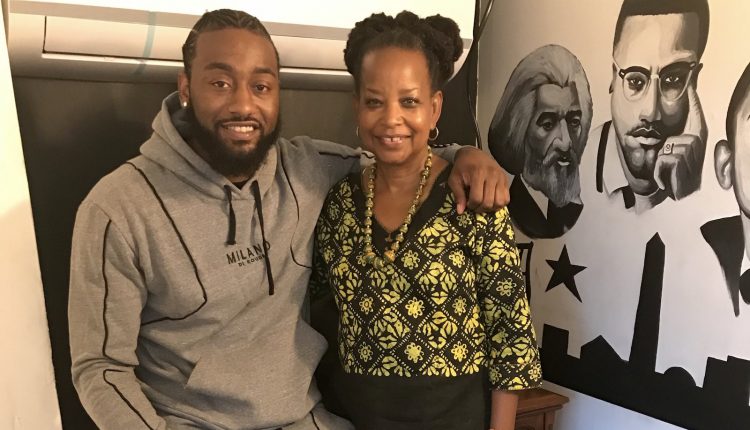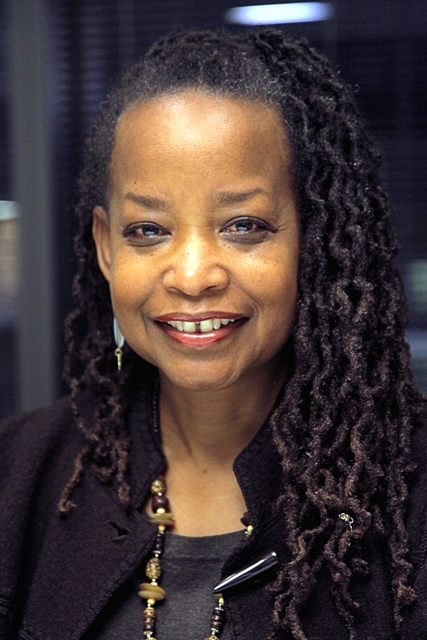
For Denise Rolark Barnes, the publisher of The Washington Informer, operating the newspaper is family business.
When asked if she ever thought she’d be where she is today, she said, “Let’s put it this way — yes, I did. Did I want to be there? No.” Therein lies the essential conflict of inheriting a family business, while wanting to go one’s own way.
Rolark Barnes’ father, Dr. Calvin W. Rolark, started the Informer in 1964, when she was just 9 years old. Working there was her only job growing up — her summer job, too — until she enrolled at Howard University, earning a degree in communications and, in 1979, a law degree. While attending Howard School of Law, she was editor of the student newspaper, The Barrister.

“After going to school and getting a law degree, this is what I came back to, and I’ve been here ever since,” Rolark Barnes said.
A year after graduation, she joined the Informer’s staff as managing editor. She took over in 1994 as publisher after her father’s death, working ever since then to uphold her father’s vision of highlighting positivity in the African-American community.
“When my dad, Dr. Calvin W. Rolark, started the newspaper in 1964, his mission was to establish an institution for, and about, Black people that would record our history as it happened,” Rolark Barnes wrote in the introduction to the newspaper’s 50th-anniversary special edition on Oct. 16, 2014. “He deeply wanted to ignite and instill pride in a race of people who would be able to read about their considerable sacrifices and contributions to create a better society. And he aspired to provide a tool to spur the economic growth of the community, as well as provide a means of support for his family. As his daughter and now publisher, I have strived to ensure that his mission continues and thrives.”
A year after the newspaper’s 50-year milestone, the DC Council adopted a ceremonial resolution honoring Rolark Barnes when she was elected chairman of the National Newspaper Publishers Association, a trade association of African-American-owned newspapers around the country.
Storytelling is at the heart of The Washington Informer. Committed to focusing on news with a hopeful spin, it aims to “educate, empower, and inform.” The paper serves the DC area with a print circulation of more than 50,000, as well as about 50,000 online readers, according to its website.
“We’re focusing on a community that doesn’t often have good news stories told about it,” Rolark Barnes said in an interview.
One recent story Rolark Barnes particularly enjoyed involved Alfred Street Baptist Church in Alexandria, Virginia. Church members raised $175,000 in one month without knowing where exactly the money would go — the organizers hadn’t yet decided on the specific recipients. They did know it would leave the church and help young people. Ultimately, $100,000 of the funds went to cover the unpaid tuition balances of 34 graduating seniors at Howard University.
“At a time when faith communities, particularly black churches, are struggling, this church showed what strength they had in their commitment to education,” Rolark Barnes told The DC Line. “Education is the historical link between black churches and schools.”
Rolark Barnes loves reading the stories of others. People who overcome odds in various ways strengthen her — no matter the person’s race or way of life. She also finds motivation in having young people around her who “still have hopes and ideas and aren’t restricted by failure or inhibitions,” she said.
“I love having idealistic, energetic, intelligent, educated young folks around me,” she added.
Rolark Barnes — who serves as secretary of the board of directors of the Washington Convention Center and Sports Authority, also known as Events DC — has lived all over DC since she was young, spending time in the District’s various wards. She loves the city’s diversity and vibrancy. “Things are close; you don’t have to travel far to have a global experience,” she said.
She tells African-American women and girls who are interested in following in her footsteps not to be afraid to reach out to people for guidance. “First of all, identify people whose paths identify closely with the path you want to travel,” she said. “Reach out and don’t be discouraged if you don’t hear from them right away — we use the word ‘mentor,’ and sometimes it’s a little scary for people who don’t always want to make that commitment, but there are always people willing to give advice.”
Rolark Barnes cites Ida B. Wells and her own mother and stepmother as strong role models. She has read a lot about Wells, an investigative journalist, civil rights activist, educator and researcher in the late 1800s and early 1900s who for a time was a newspaper publisher. “She took on the whole issue of lynching and attempted to work with her colleagues in the civil rights and women’s rights movements to make sure the voices of African-American women were heard,” Rolark Barnes said. “She did it as long as she could despite the odds and despite people fighting against her, including the black male leadership of that time — she was driven in her hopes of making a difference.”
Another of Rolark Barnes’ role models — her stepmother, the late Wilhelmina Jackson Rolark — was a lawyer and DC Council member for Ward 8 from 1977 to 1993. A recent Washington Informer tribute described the couple as a “dynamic duo” who sought to improve life in Ward 8 and the rest of DC. “Like Wells, she was a fighter,” Rolark Barnes said.
She continues to draw inspiration from her mother, Vera Abbott. “My mother is still living, thank goodness,” Rolark Barnes said. “She’s always been very active in the community and strives to make a difference in the community. She doesn’t live too far from me.”
That same desire to make a difference propels Rolark Barnes in her work at The Washington Informer. But when she feels discouraged or encounters adversity in her work or personal life, she glances at a sign on her wall.
It reads: “When I get tired I think about what Harriet Tubman did for a living.”
In honor of Women’s History Month, The DC Line is profiling notable women shaping DC. This is the third in a series of four articles we’ll be publishing this month; the first two profiled Trinity Washington University President Pat McGuire and D.C. Policy Center executive director Yesim Sayin Taylor.


Great story of following a path and being true to it.